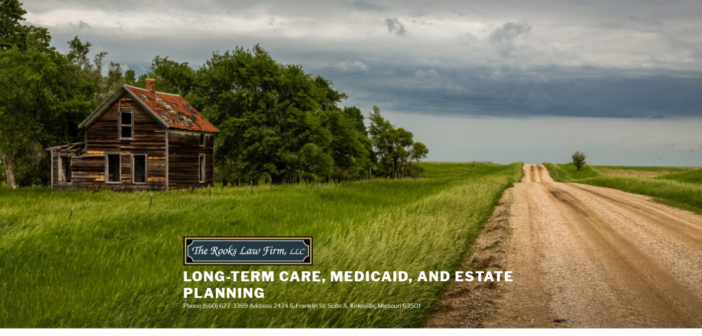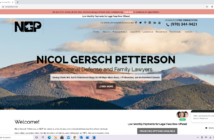Steady growth has come from involvement in community life, beginning with court appointments and volunteering and continuing with Facebook posts, senior-event attendance, and cross-referrals.
Jessica Rooks has built a successful solo law practice in a small town surrounded by miles of farmland. The keys to her success have been finding ways to maintain visibility in the community, and ways to make herself as accessible as possible to a far-flung clientele—for instance, by driving an hour on country roads for a home visit if necessary, or, since the Covid-19 pandemic began, via Webex video workshops and Zoom meetings.
Community Visibility
At about the same time that Rooks launched her law practice in Kirksville, a town of 17,000 in rural northeastern Missouri, the town was abuzz with news of the arrival of an electronic bulletin board on Main Street. “We are a small town, so everybody was pretty excited to see that,” says Rooks, who “got in on part of that excitement” by purchasing a display ad announcing that she was open for business.
She hasn’t done anything quite that flashy in the way of advertising herself since that debut in 2012, months after picking up her law degree. “But it was good just to let more people know that I was here.”
Making her presence known is something Rooks started doing before graduated from the University of Missouri School of Law. “I really was trying to get involved in the local community even when I was in law school,” says Rooks, who attended Truman State University in Kirksville as an undergrad. She did an internship at the public defender’s office and, while still in law school, earned a mediation certificate and presided over volunteer mediation sessions in small claims court.
Court Appointments
In her first year in practice, Rooks also took on some court-appointed guardian ad litem work representing the interests of children in family court cases, which led to an opportunity to be the juvenile office attorney for a circuit court. Those matters involving minors were far afield from estate planning and elder care, the intended focus of her practice. But it helped her on the way toward her career of choice.
“As I was growing my actual practice, I was introducing myself to people and to the local courts and letting them know I’m here,” Rooks explains. “There are a lot of things that you can get by appointment from the court when you start out. I think it’s a really great way to get your name out there and for people just to see how you handle yourself. Those are the jobs that connected me and got my name out to the community.”
It is of course imperative that you not only show up but do a great job. “A key to growing my business was taking whatever I did and really doing it like it was the most important thing to me,” Rooks explains. “I treated a small guardian ad litem job as if it was a very big deal and I think that showed. Little things like that start to build, especially when you’re in a small town where word of mouth is very big. Word of mouth is going to be bigger than anything. It has a snowball effect.”
Volunteering
Meanwhile, after hours in her early years as a lawyer, Rooks was introducing herself and making connections in the local business community through the Chamber of Commerce.
It’s an organization “that’s always willing to have people who want to help out,” says Rooks, who joined soon after opening her practice. “Once they saw that I was eager to be a part of the Chamber, it was within a couple of months, honestly, that they asked me to be on the board.” She served on the board for four years including a stint as president. The Chamber’s monthly networking events, and an annual trivia competition, “have been a great way to get to know other businesses and form relationships.”

Small Town Clientele on Facebook
Rooks’ practice has now passed the eight-year mark and is “thriving,” she says. She moved to a larger office two years ago to comfortably accommodate herself, space for her children after school, and for a staff of two part-time secretaries, one who focuses on probate cases and the other who helps her with Medicare matters.
Over the years since her debut on the electronic bulletin board, Rooks has done some advertising. “Sometimes I have made flyers to hand out at local businesses, and there are other local publications that I will sometimes put an ad in,” she says. “But that is not the key to what I do. It just tends to fill in some of the gaps.”
Rooks has found that posting regularly on Facebook is one of the best ways to maintain connections with her clients and potential clients. “It’s a good tool to use to reach my clientele because that’s where a lot of them are,” she says. “It’s a good way to try to connect with people and to share about how the law office is doing and what we’re up to. I have a lot of local people from the community that like both my personal page and my business page.”

Reaching Out Virtually
For a clientele scattered far and wide in rural northeast Missouri, Rooks says her standing offer has always been, “I will come to them,” whether they are in a hospital, a nursing home, or a distant farmhouse. “Sometimes that means I’m going to have an hour’s drive on country roads, but that is part of what it means to meet my clients’ needs. I try to make myself available to them as much as conveniently possible.”
In the spring of 2020, during the nationwide lockdown to slow the spread of Covid-19, Rooks quickly shifted to remote means of maintaining connections with her clientele. In April, she recorded two workshops on the Webex videoconferencing platform and posted links on her Facebook page, where each debuted on Facebook Live. One is a 24-minute presentation on power of attorney and the other, a 27-minute video on the basics of estate planning. In each, she takes a moment to introduce herself as a local mom with three young kids and a husband who shares her passion for gardening.
“That was a great way for my clients to still be able to learn about things of interest to them without leaving their house,” she says. “And it was interactive, so they could ask questions.”
Rooks found that her clients adapted quickly to the new ways of remotely communicating, and revealed ways that the technology will continue to be useful in post-pandemic times. “They are very comfortable with it because they’ve used Zoom for work or church or family visits,” Rooks says. “Having that as an option has made it where my elderly clients don’t have to be at risk to see me but can still continue to work with me on things like estate planning that are very important right now, even though the risk is high for getting out.”

Groups that Love Speakers
The Facebook Live sessions and Webex video workshops have filled in well enough under the circumstances. But Rooks has found that public appearances have been one of the most effective ways of introducing herself to prospective clients, and at some point, “people will want to re-engage with people.”
She has always made a point of attending events where her target clientele is likely to congregate, whether she has a speaking engagement or not. “I serve the elderly so when there is a senior fair or anything like that, I go to those events. Sometimes I will have my own little spot, but a lot of times I just want to get to know what resources are available for the elderly and what different agencies do for people.” At the same time, “they get to know what I do.”
Those encounters can lead to ongoing relationships. “Whenever I go to those events or sponsor something, I let people know I’m willing to talk and willing to offer information. What I have found is that organizations, whether Rotary Clubs or churches or whatever, love an opportunity to have speakers who can talk about things their members are interested in. I can teach people about the basics of power of attorney, and wills, and things of that nature — not that anybody has to hire me. It just gives people an opportunity to get information,” Rooks says.
“Sometimes I will do speaking events that don’t even relate to what I do. It’s just giving back to the community. For example, I sometimes speak at local college classes about the basics of what it means from a legal perspective to be an adult.”

The Rooks Law Firm law office, on Google Streetview
Small Town Life
Over her eight years building a law practice in a small town, Rooks has never had any territorial conflicts with other lawyers. Quite the contrary. “There is always, in my opinion, plenty of room for new attorneys, especially in rural Missouri. You are never going to have a shortage of clients. We have multiple counties being served by one attorney. That’s it. One attorney. So having new people is a good thing.”
When her clients ask for help with cases outside her area of interest, such as family or criminal law, she has lists of attorneys nearby who are better able than she to handle those matters, and they, in turn, send trusts and estates matter her way. That’s about the extent of her dealings with the bar in her corner of Missouri.
Rooks has staved off any sense of professional isolation thanks to her membership in the National Academy of Elder Law Attorneys. “Even though I don’t have anyone near me in Kirksville that specializes in this area, I can find online resources and go to conference rooms and establish relationships with other people across the state and ask how they are doing. That is huge,” she says, of the benefits of networking with specialists in the same field who are happy to share what they know.
“I think if you are good at what you do, for the most part, you don’t mind if a new person comes along. Everybody is trying their best to do what they do. There’s plenty of work to go around.”




